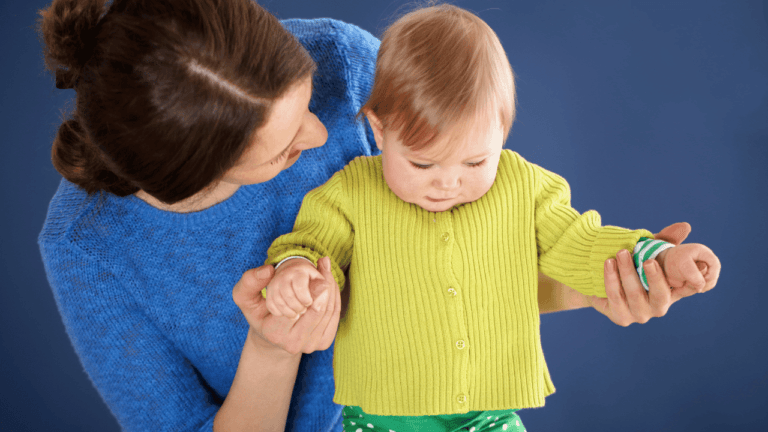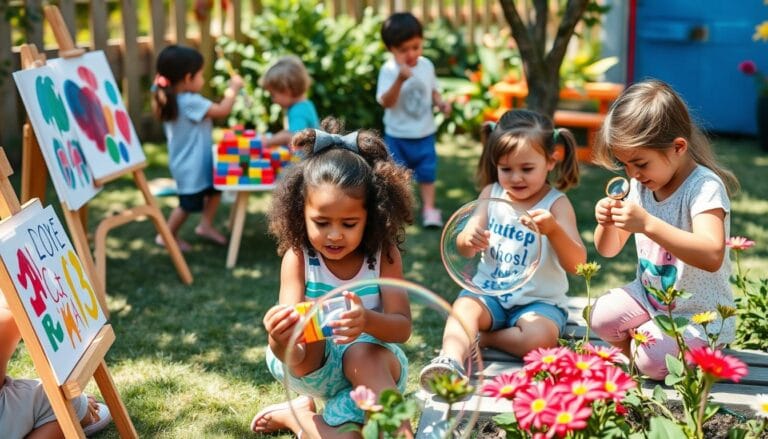
Partners in Parenting: Thrive as a Team in Childcare
Building strong partnerships between parents and childcare providers is crucial for effective parenting and the overall well-being of children. Family engagement plays a vital role in creating meaningful connections and fostering a sense of involvement. Parent involvement and family engagement are two concepts that work hand in hand to support the healthy development of children. By understanding the differences between the two and implementing strategies to promote family engagement, parents and childcare staff can work together to ensure the best outcomes for children’s growth and success.
Key Takeaways:
- Building strong partnerships between parents and childcare providers is crucial for effective parenting.
- Family engagement fosters meaningful connections and a sense of involvement.
- Parent involvement and family engagement work together to support children’s healthy development.
- Understanding the differences between parent involvement and family engagement is important.
- Implementing strategies to promote family engagement leads to better outcomes for children.
The Importance of Family Engagement in Childcare
Family engagement plays a vital role in promoting the overall well-being and healthy development of children. It is a process that involves building genuine relationships with families to create partnerships focused on helping children grow and thrive.
Strong relationships between childcare staff and families are key to fostering positive parent-child relationships, promoting family well-being, and facilitating ongoing learning. When families feel valued and heard in their child’s educational journey, they are more likely to actively engage in their child’s learning both at home and in school.
Research has shown that parental involvement significantly contributes to a child’s academic achievement and success. By actively participating in their child’s education, parents play an integral role in supporting their child’s development and creating a conducive learning environment.
The Benefits of Family Engagement in Childcare:
- Promotes positive parent-child relationships
- Enhances family well-being
- Supports ongoing learning
- Boosts academic achievement and success
Emphasizing family engagement in childcare ensures that families are active participants in their child’s educational journey. It strengthens the partnership between parents and childcare providers, creating a collaborative environment that supports the holistic development of children.
| Family Engagement Strategies | Impact on Child Development |
|---|---|
| Regular communication between parents and childcare staff | Facilitates a sense of security and trust for children |
| Parent involvement in decision-making processes | Creates a sense of ownership and empowerment for children |
| Joint activities and events involving parents and childcare staff | Promotes social and emotional development |
Implementing family engagement strategies in childcare centers contributes to the overall development and well-being of children. It fosters a shared responsibility between parents and childcare providers, ensuring that children receive consistent support and guidance both at home and in their early care and learning settings.
Next, we will explore the concept of parent involvement in childcare and its significance in supporting children’s growth and success.
Understanding Parent Involvement in Childcare
Parent involvement plays a crucial role in a child’s early care and learning journey. When parents actively participate in activities and take advantage of opportunities within the childcare setting, it promotes a supportive and enriching environment for children to thrive. This section explores the different aspects of parent involvement and how it benefits children’s overall development.
The Benefits of Parent Involvement
Parent involvement fosters a strong foundation for a child’s growth. When parents and caregivers actively engage in their day-to-day activities, it promotes a sense of security and trust, which are essential for a child’s development. The bond between parents and childcare staff creates a collaborative partnership that nurtures the child’s well-being and success.
- Children experience a smoother transition between home and childcare, leading to a more positive and comfortable environment.
- Parent involvement enhances communication between parents and childcare providers, allowing for better support and alignment in meeting the child’s needs and goals.
- Children gain a sense of belonging and self-worth when they see their parents actively involved in their learning and social activities.
- Parent involvement provides valuable insights and perspectives that contribute to the overall program quality and improvement.
Methods of Parent Involvement
There are various ways for parents to actively engage in their child’s early care and learning setting. These activities can include:
- Attending meetings and special events
- Participating in social activities or parent committees
- Regularly communicating with childcare staff to stay informed about their child’s progress and needs
- Contributing to the development and evaluation of program policies and practices
Parent involvement goes beyond individual activities; it encompasses a continuous partnership between parents and childcare providers in supporting children’s growth and development.
Promoting Parent Involvement in Childcare Centers
Childcare centers play a vital role in promoting parent involvement by creating an open and welcoming environment that encourages parental participation. Some effective strategies include:
- Fostering a culture of collaboration and inclusivity
- Providing resources and materials for families to support their child’s learning at home
- Seeking input and feedback from parents to shape program activities and policies
By actively involving parents in their child’s early care and learning, childcare centers can create a strong foundation for a child’s development and ensure a positive and meaningful experience for everyone involved.
Parent involvement in childcare activities creates a supportive and enriching environment for children to thrive.
Nurturing Family Engagement in Childcare
Family engagement in childcare goes beyond parent involvement. It involves a shared process of relationship-building, which is ongoing and responsive to a family’s language and culture. Childcare professionals and families work together as a team to support the care and learning of children. This collaborative approach includes shared decision-making, planning, and implementing activities and events that reflect the cultural traditions and strengths of the families. Family engagement not only prepares families to be involved throughout their child’s school years but also strengthens the parent-child relationships that are vital for a child’s healthy development and school readiness.
| Benefits of Family Engagement in Childcare | Strategies for Nurturing Family Engagement |
|---|---|
|
|
Promoting Parent Engagement in Childcare

Parents play a crucial role in fostering their child’s development. By actively engaging with their child, parents can create a nurturing environment that supports their growth and learning. There are several strategies that parents can implement to promote parent engagement in childcare.
1. Parent-Child Interactions
Quality time spent playing, talking, and engaging with the child is essential for building strong parent-child relationships. These interactions provide an opportunity for parents to bond with their child, understand their interests and needs, and promote emotional well-being.
2. Daily Routines
Establishing consistent daily routines at home can provide a sense of stability and structure for children. Regular mealtimes, bedtimes, and other daily activities help children develop a sense of security and predictability. These routines also create opportunities for parents to engage and interact with their child in meaningful ways.
3. Book-Reading
Encouraging book-reading from an early age has numerous benefits for children’s development. It supports language and literacy skills, expands their vocabulary, and fosters a love for learning. Parents can incorporate book-reading into their daily routine, create cozy reading corners, and choose age-appropriate books that spark their child’s interest.
4. Social Interactions
Parents should provide opportunities for their child to engage in social interactions outside of school. This can include playdates, community activities, and involvement in extracurricular programs. Social interactions help children develop social skills, learn how to communicate effectively, and build friendships.
5. Planning and Responsibility
Parents can involve their child in activities that require planning and carrying out tasks. This promotes independence, decision-making skills, and a sense of responsibility. Simple tasks such as planning a family outing, organizing their toys, or helping with household chores can provide valuable learning experiences for children.
By implementing these strategies, parents can actively engage with their child and create an enriching environment that supports their development. Parent engagement in childcare goes beyond involvement; it focuses on building meaningful connections and fostering a sense of partnership between parents and their child.
| Strategies | Benefits |
|---|---|
| Parent-Child Interactions | – Strong parent-child relationships – Emotional well-being |
| Daily Routines | – Stability and structure – Parent-child bonding |
| Book-Reading | – Language and literacy skills – Love for learning |
| Social Interactions | – Social skills development – Communication skills |
| Planning and Responsibility | – Independence and decision-making – Sense of responsibility |
Effective Communication with Families in Childcare
Positive communication is the cornerstone of building trust and nurturing strong partnerships between childcare staff and families. By cultivating effective communication skills, childcare providers can inform, reassure, and engage families, ensuring they feel valued and heard throughout their child’s journey. Through positive communication, the childcare program can create a favorable impression and demonstrate its commitment to meeting the needs of every child.
Trust plays a pivotal role in maintaining a solid partnership between childcare staff and families. When families trust the program, they can collaborate as a team to support children in achieving their goals. Trust is built through open and transparent communication, where accurate information is shared, and expectations are managed effectively.
Establishing a foundation of trust and positive communication sets the stage for a successful partnership, where parents and childcare providers work together harmoniously. Through this partnership, families can actively contribute their insights and expertise, and childcare staff can provide valuable guidance and support.
Here are some key strategies to enhance positive communication and foster trust in childcare:
- Listen actively: Show genuine interest in what families have to say, and give them the space to express their thoughts and concerns.
- Be responsive: Respond promptly to messages and inquiries, demonstrating that families’ needs and questions are a priority.
- Use clear and respectful language: Choose words carefully, ensuring they are easily understood and convey respect for diverse perspectives.
- Provide regular updates: Keep families informed about their child’s development, activities, and any changes in the childcare program.
| Benefits of Effective Communication |
|---|
| Informed and engaged families |
| Increased parent satisfaction |
| Improved child outcomes |
| Stronger partnerships and collaboration |
Effective communication strengthens the bond between childcare staff and families, promoting a sense of belonging, understanding, and shared responsibility. By nurturing positive communication and trust, childcare providers can cultivate powerful partnerships that empower families and ensure the well-being and success of every child.
Strengthening Relationships with Families in Childcare

Building strong and goal-oriented relationships with families in childcare is essential for creating a supportive and nurturing environment. By taking a strengths-based approach, childcare providers can work with families to build positive relationships, even in the face of challenges. Understanding and respecting families’ cultural perspectives is crucial in building trust and promoting effective communication.
To strengthen relationships with families, childcare staff can engage in activities and events that reflect their cultural traditions and strengths. This not only helps foster a sense of belonging but also encourages families to actively participate and contribute to the childcare community.
Reflective practice and supervision are key in enhancing childcare staff’s understanding of cultural perspective-taking. By continually learning and developing a collaborative and responsive practice, childcare providers can optimize their work with families and create a more inclusive environment.
| Benefits of Strengthening Relationships with Families in Childcare |
|---|
| 1. Enhanced Trust: Building strong relationships based on mutual respect and understanding fosters trust between families and childcare providers. |
| 2. Improved Communication: Effective communication is nurtured when families’ cultural perspectives are acknowledged and valued, allowing for better collaboration and understanding. |
| 3. Increased Family Involvement: When families feel supported and respected, they are more likely to actively engage in their child’s education and contribute to the childcare community. |
| 4. Strong Parent-Provider Partnerships: Strengthening relationships with families creates a foundation for effective partnerships, where joint decision-making and shared goals can be achieved. |
| 5. Promoting Cultural Responsiveness: By embracing and respecting families’ cultural traditions and strengths, childcare providers create a diverse and inclusive environment that celebrates each child’s unique background. |
Collaborative Activities: Celebrating Cultural Traditions
An effective way to strengthen relationships with families is through collaborative activities that celebrate cultural traditions. These activities not only promote inclusion and cultural awareness but also provide opportunities for families to share their backgrounds and experiences. Some examples of collaborative activities include:
- International potluck dinners, where families can bring and share traditional dishes from their cultures.
- Cultural festivals or performances, where families can showcase traditional dances, music, or arts.
- Bilingual storytimes, where families can read stories in their native languages and introduce children to different cultures.
- Craft workshops, where families can teach and participate in traditional arts and crafts from their cultures.
Partners in Parenting: PIP Aftercare Program
Partners in Parenting (PIP) is a home and community-based Aftercare Program that provides comprehensive services to families in New York City who have a child with a chronic or complex medical condition, developmental disability, or behavioral health issues. PIP operates on a clinical, case management model, with each family being assigned a Social Worker who collaborates with parents to develop goals and objectives for a service plan. The program aims to ensure that families receive appropriate services to meet their children’s educational, physical, and mental health needs. PIP offers a range of services, including counseling, case coordination, educational advocacy, and access to resources.
PIP Aftercare Program Services:
| Service | Description |
|---|---|
| Counseling | Individual and family counseling to address emotional and psychological needs. |
| Case Coordination | Comprehensive coordination of services, including medical, educational, and therapeutic interventions. |
| Educational Advocacy | Assistance in navigating the educational system and advocating for appropriate support and accommodations. |
| Access to Resources | Providing families with information and connections to community resources, support groups, and financial assistance programs. |
- Comprehensive services tailored to meet the unique needs of each family.
- Collaborative approach between Social Workers and parents to develop personalized service plans.
- Aim to support children’s educational, physical, and mental health needs.
- Access to counseling, case coordination, educational advocacy, and resources.
Partners in Parenting’s Aftercare Program is committed to providing the necessary support and resources for families, ensuring their children receive the best care possible. Through the partnership between PIP and parents, comprehensive services are delivered to address the specific challenges faced by families with children who have complex medical conditions, developmental disabilities, or behavioral health issues.
Conclusion
Parenting strategies, childcare teamwork, and family engagement are vital elements in creating a nurturing and supportive environment for children’s growth and development. When parents and childcare providers work together as partners in parenting, children can thrive and reach their full potential. It goes beyond mere participation in activities and events; it involves building meaningful relationships, effective communication, and mutual respect.
By promoting parent involvement and family engagement, childcare centers and Aftercare programs, such as Partners in Parenting (PIP), play a crucial role in supporting families and providing comprehensive services tailored to their unique needs. Through PIP’s clinical, case management model, families can access counseling, case coordination, educational advocacy, and resources to ensure their children’s educational, physical, and mental health needs are met.
Working in tandem, parents and childcare providers create a cohesive and supportive environment where children’s well-being and success are prioritized. With strong partnerships, effective communication, and a commitment to family engagement, the foundation is laid for children’s growth and success in both their early care and learning settings and their home environments.
Frequently Asked Questions
What is the importance of family engagement in childcare?
Family engagement is crucial in creating meaningful connections and fostering a sense of involvement. It promotes positive parent-child relationships, family well-being, and ongoing learning.
What is the difference between parent involvement and family engagement?
Parent involvement refers to parents actively participating in activities and taking advantage of opportunities at their child’s early care and learning setting. Family engagement, on the other hand, involves building genuine relationships with families to support their overall well-being and their child’s healthy development.
How can childcare centers promote parent involvement?
Childcare centers can foster an open and welcoming environment, provide resources for families, and actively seek their input and feedback to promote parent involvement.
How does family engagement go beyond parent involvement?
Family engagement involves a shared process of relationship-building, ongoing and responsive to a family’s language and culture. It includes shared decision-making, planning, and implementing activities that reflect the cultural traditions and strengths of the families.
What can parents do to promote their engagement in childcare?
Parents can spend quality time playing, talking, and engaging with their child, create consistent daily routines at home, encourage book-reading and familiarize children with symbols, and involve them in activities that promote independence and responsibility.
Why is positive communication important in childcare?
Positive communication helps inform, reassure, and engage families, creating trust between childcare staff and families. It sets the tone for a successful partnership and ensures families feel valued and heard.
How can childcare staff strengthen relationships with families?
Childcare staff can build goal-oriented relationships focused on families’ strengths, understand and respect cultural perspectives, and engage in activities and events that reflect their traditions and strengths.
What is the Partners in Parenting (PIP) Aftercare Program?
Partners in Parenting (PIP) is a home and community-based Aftercare Program in New York City that provides comprehensive services to families with children with chronic or complex medical conditions, developmental disabilities, or behavioral health issues.
How can parents and childcare providers work together as partners?
By promoting strong partnerships, parents and childcare providers can ensure the well-being and success of children. This includes building meaningful relationships, effective communication, and mutual respect.














